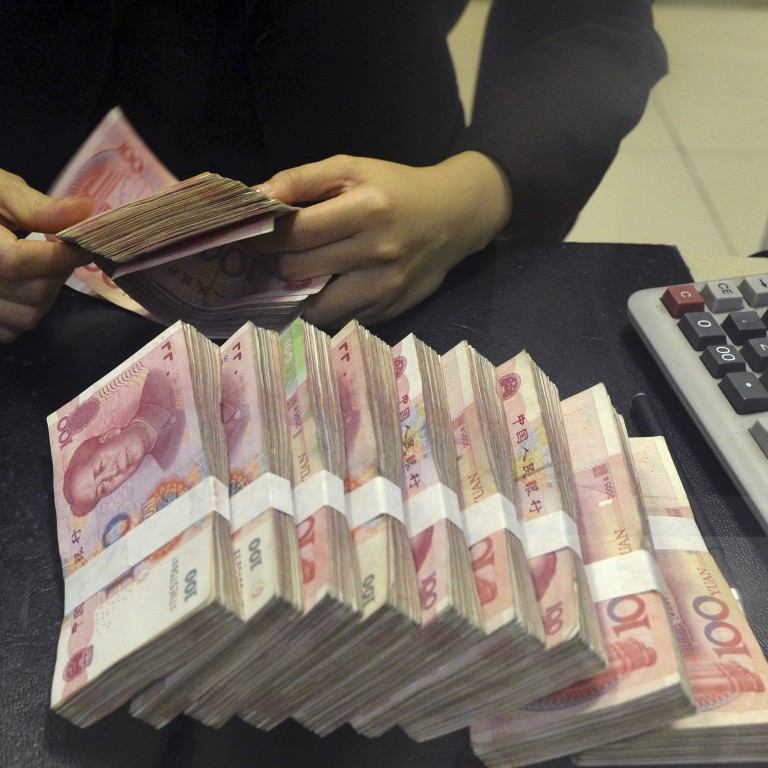
Coronavirus: China tries to bolster confidence in banknotes as fears of contamination mount
- China’s central bank has stepped up efforts to assure the public that handling cash is safe amid the coronavirus pandemic
- Concern the virus can be transmitted by banknotes and coins has led to a surge in online search activity about safety
The coronavirus outbreak has further discouraged cash use in China’s increasingly cashless society over fears it can be transmitted by banknotes and coins, discomforting the country’s only money issuer, the People’s Bank of China.
In one extreme case, a Chinese citizen in Jiangsu recently tried to “disinfect” cash by putting it into a microwave oven, burning the banknotes in the process.
During a video conference this month, Fan Yifei, a deputy governor at the People’s Bank of China, said efforts had been made to improve “the level of cleanliness” of cash in circulation and it would continue to punish merchants who refused to accept banknotes and coins.
“Since the outbreak of the novel coronavirus epidemic, the security system has been strengthened to ensure the safety of cash supply and its use,” the bank said.
Concerns about the safety of carrying cash amid the virus are not limited to China alone.
Internet searches for both “cash” and “virus” have surged to record highs in recent weeks, dwarfing searches in several East Asian and European countries during the H1N1 flu epidemic in 2009, the Middle East respiratory syndrome (Mers) outbreak in 2013, and Ebola in 2014.
The spike in searches reflects the unprecedented public concern about viral transmission via cash, the Bank of International Settlements (BIS) wrote in a recent report.
Search activity appeared to be more prevalent in countries where more small banknotes – the type used for daily transactions – are in circulation relative to gross domestic product, including in Australia, Singapore, Canada, Britain and the United States, the BIS said.
There is little hard evidence that cash can transmit the virus, but banknotes and coins are known to be unhygienic.
For instance, human flu can persist for hours or even days on banknotes, according to 2008 research by Yves Thomas, a doctor at the Division of Infectious Diseases at the University of Geneva.
The World Health Organisation advises people to wash their hands after handling money, especially if touching or eating food, but there are no medical warnings against using banknotes.
As the virus has spread around the globe, infecting nearly two million people, central banks have begun disinfecting cash, including in South Korea, the US, Hungary, Pakistan and Kuwait.
Wayne Chen, founder of virtual currency platform Coincurve, said many central banks were looking to create their own digital currencies before the pandemic, but there was a long way to go before they would be used.
Eliminating physical fiat currency too quickly would hurt the poor, who have no other method of buying food and being paid for labour, said Fran Strajnar, CEO at Techemy, a provider of cryptocurrency market research.
“Now with the backdrop of a global epidemic and an economic disaster worse than the great depression, central banks are hopefully not going to rush a new currency to market without sound checks and balances in place,” Strajnar said.
China is often viewed as the one of the first nations moving towards a completely cashless society. Mobile payments made on banking platforms surged to 347.11 trillion yuan (US$49.2 trillion) last year via 101 billion transactions, up sharply from 277.39 trillion yuan (US$39.3 billion) via 60.53 billion transactions in 2018.
With 800 million phone users and easy to use mobile applications like Alibaba’s Alipay and Tencent’s WeChat Pay, Chinese people have embraced digital payments.
Some 86 per cent of the population use their phones to pay for everything from clothes and food to hailing taxi rides, according to iResearch, a consultancy for online business services in China.
Alibaba owns the South China Morning Post.
Sign up now and get a 10% discount (original price US$400) off the China AI Report 2020 by SCMP Research. Learn about the AI ambitions of Alibaba, Baidu & JD.com through our in-depth case studies, and explore new applications of AI across industries. The report also includes exclusive access to webinars to interact with C-level executives from leading China AI companies (via live Q&A sessions). Offer valid until 31 May 2020.

